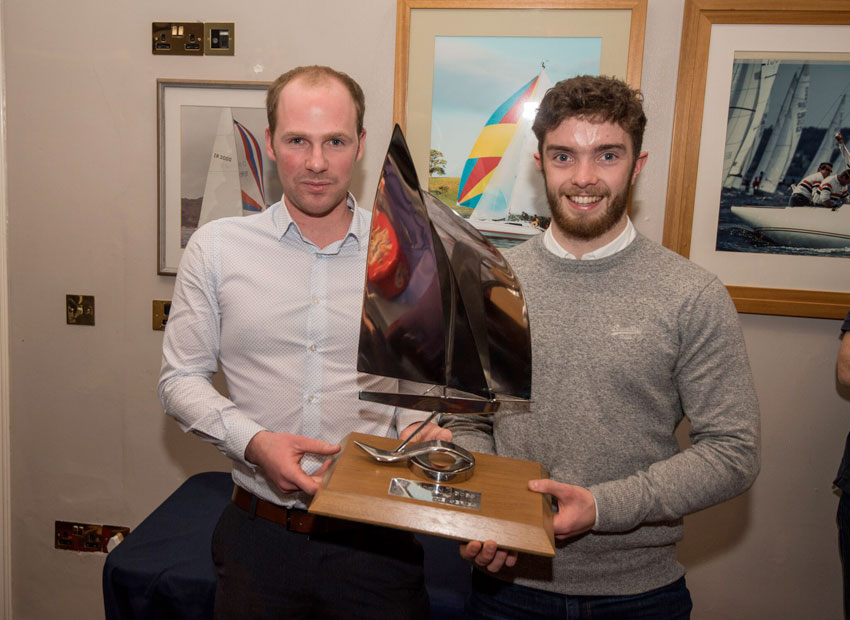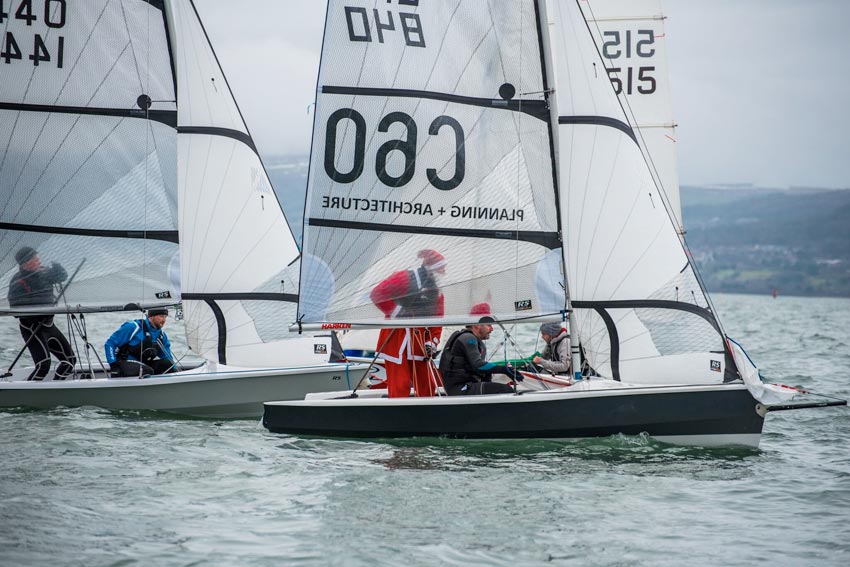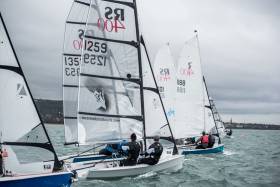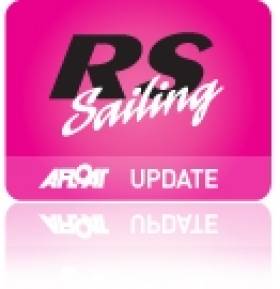Displaying items by tag: RS 400
Bosun Bob’s RS 400 Autumn Series Concludes At Royal North
#RS - Sunday 17 December saw the end of the Bosun Bob’s RS 400 Autumn Series hosted annually at Royal North of Ireland Yacht Club.
The series has built up over the last 10 years to now have up to 18 boats on the start line in Cultra every Sunday for the eight weeks, with the hardy sailors and race committee braving some tricky and sometimes bitterly cold conditions on Belfast Lough.
The race team try to get four short bullet back-to-back races of around 15-20 minutes each. This strategy has proven to be very popular with the competitors, encouraging new members to join the class of the performance two-man boats.
Competition at the top was very tight in this year’s series, but after 16 races the Bosun Bob’s trophy went to Paul McLaughlin and Owen McKinley.

The final races also welcomed a seasonal guest competitor in the shape of Santa Claus himself!

RS 400 racing at the Royal North is due to resume with the Spring Series in mid February 2018.
Photos: Bradley Quinn
#RSsailing – Normally you have to drive for a couple of days with an overnight ferry and a long slow tunnel through a montagne to get sailing conditions like those enjoyed by the RS fleets at Strangford Lough, this weekend.
Sunshine both days normally means one good day, balanced by another with fickle breeze and a lot of sitting around. Thankfully the high pressure system in the Atlantic sat far enough the left to drag a steady northerly airstream whizzing straight down the lake like the Ora we so love in Italy. Okay, so it wasn't 25 degrees and in fresh water, no spectacular cliffs plunging into the lake as James Bond writes off a new Aston in the tunnel by the start line, and the sun was on the wrong side of the rig, but the breeze was super steady, with the only shift over 10 degrees was the one on Saturday night which meant the windward mark was set 100 metres left of its starting position the first day. It was also every bit as beautiful with the green rolling basket of eggs topography and low lying islands dotted around.
As always the crew at SLYC looked after us terrifically well, with a great team led by Mark Fletcher. Rock and roll on Saturday night was provided by the maestro himself, Charles Horder, outstanding.
With no hills to mess with the wind, we were treated to a fantastic force 2-4, with no need to muck about with the course between races. Speed is king in this sort of breeze = pain in the legs, but with the adrenaline maxing out on the dials, there was no time to complain. Needless to say, the kings of speed were Dr Bob and Mike Gunning, racking up 5 bullets to easily take the crown for the nth year in a row. With the result not really in doubt after Saturday's four races, many would be expected to plan an early drive home after Sundays two planned races, but that is not why we sail RS400s. A quick straw poll on Saturday after racing drew an unopposed majority decision to run an extra 7th race on Sunday. Just as well for many on Sunday race 1, as a bit of confusion spread from the pointy end to the middle of the running order, with half the fleet deciding to sail to the finish line after lap 2. Never a good thing to do in a three lapper, the race leaders were to limp home in double figures, and Espey rolled in the winner yet again.
Race 6 was notable for the fact that Bob and Mike didn't win, after Dr DC and Hardman Steve Kane romped off for one of the most impressive victories in living memory. Their amazing uphill speed, mostly fear driven, was to immediately desert them in race 7, with the usual running order resuming and a 5th Espey bullet. If it sounds like the event winners had an easy ride, it wasn't the case, with plenty of teams pushing them hard before their class brought them through in the end. Multiple Irish Champions Gareth Flannigan and Dave Fletcher bagged lots of 2s to claim a deserved 2nd, and Sean Cleary and Steve Tyner would undoubtedly have got a bit closer with some more consistency, as they were frequently the only ones with boat speed to match the Ballyholme duo.
First geriatrics were Dr C and Stevie Kane in 4th, courtesy of 2 wins and Dave Rose's exploding rudder stock, which stymied his impressive upward progress since joining the fleet this year. Another new face getting faster all weekend was Chris Penney, ex laser Champion, slotting in at 7th in their first event, whilst Aidan MacSweeney of Corkway scored his first top 10 in 9th, despite having the handicap of Ben Duncan crewing for him. Robbie Gilmore with his old man John, showed that Charlie Horder's horse is actually a very fast boat in the right hands, as top SLYC team in 10th, and first laydee was Paul McMahon in 12th. We were also treated to the sight of the great Peter Kennedy finally racing a 400, thanks to Saturday-racing-only-please Terry Fair's generous loan of his boat.
So, 25 RS400s at a regional event......getting hotter!
Given the timing of this event the RS200 and Feva fleets were much depleted by exams and holidays. The Fevas were won by this years new pairing of Alison Dolan and Grainne Young from Blessington and NYC respectively, followed in second by Triona Hinkson with Cathy Kelly from the RSGYC. Third overall was Helen O Beirne and Cliona Coyle. Also out in their first event were local girls Juliette Kennedy and Lucy Bell. Testing conditions in the wind for these youngsters who all showed remarkable boat handling. The 200s were won by Sarah Byrne and Heather King from Greystones and RSGYC, followed by Aaron Jones and Conor Clery also from Greystones. Third was father and daughter paining of Michael and Meg Tyrell from RIYC.
Next event up for the RS family is the Westerns at Lough Ree on July 19/20th.
Results here































































